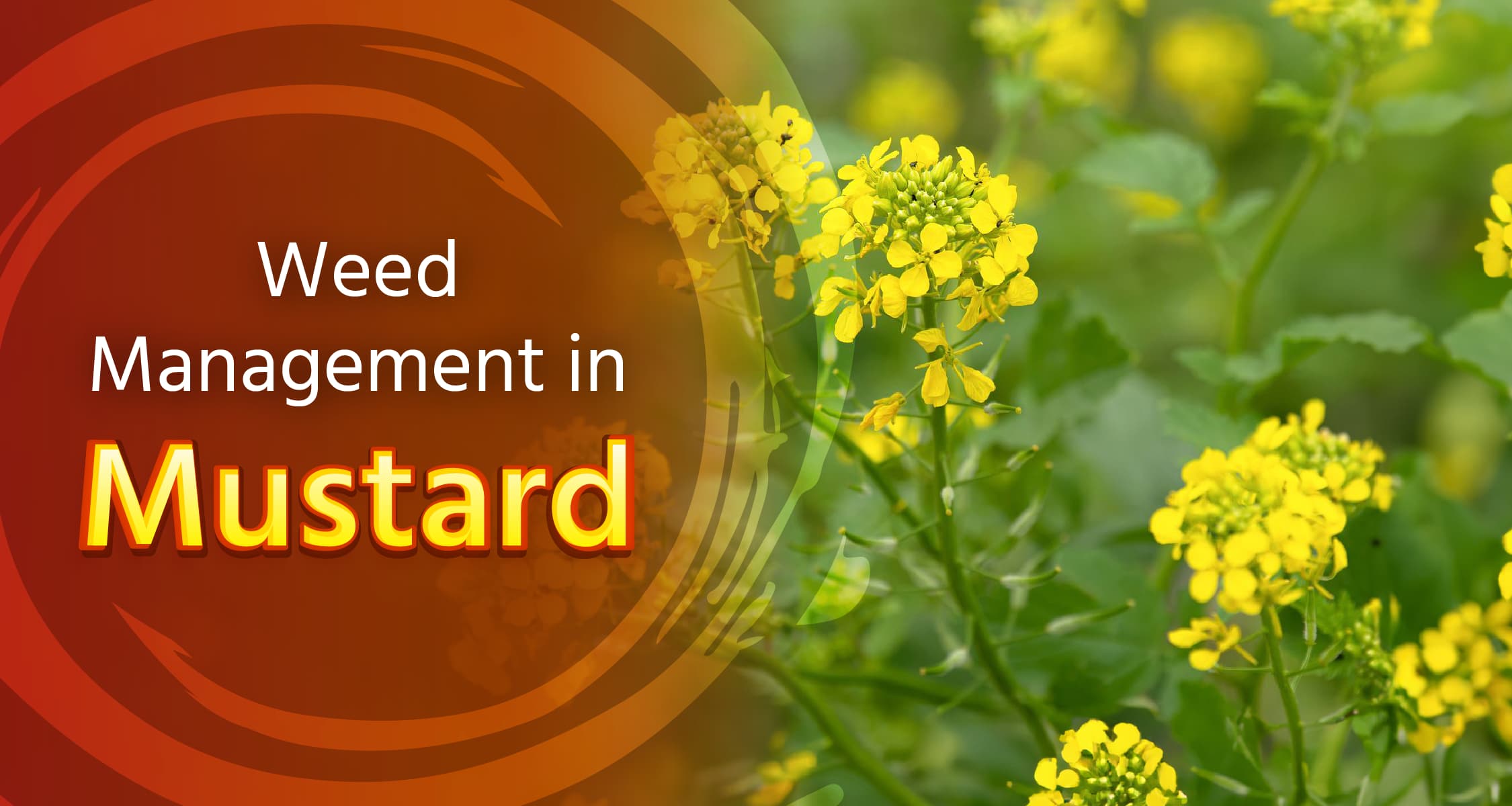Weed Management in Mustard Crop

Mustard is an important oilseed crop for Indian farmers, not only for edible oil production but also from an economic perspective. However, weeds have emerged as a major problem in mustard farming, negatively affecting plant growth, nutrition, and overall crop yield. Due to weeds, mustard yields can be reduced by 20 to 70% across different varieties. In some cases, weeds also reduce the oil content in the seeds. Therefore, effective weed control is essential to obtain good profits from mustard cultivation.
Proper and timely weed management is crucial in mustard farming to enhance productivity and allow farmers to earn higher profits. This article will provide detailed information on the damage caused by weeds in mustard crops and the various methods to control them effectively.
Damage Caused by Weeds in Mustard Crop
Nutrient Deficiency
- Weeds present in the field absorb nutrients, depriving the mustard plants of the necessary nourishment. This weakens the plants, leading to a reduction in the number of flowers and pods.
Reduction in Yield and Quality
- Weeds not only decrease the yield of the crop but also affect its quality. Additionally, the taste of the grains and leaves can be compromised.
Decrease in Oil Content
- An abundance of weeds in the mustard crop is a major cause of reduced oil content in the seeds, which leads to financial losses for farmers.
Pest and Disease Infestation
- Weeds provide a breeding ground for various pests and diseases. The presence of weeds in the field lowers the crop's resistance to diseases, making the plants more susceptible to infections and pests.
Economic Loss
- The decrease in yield, along with the increased cost of controlling weeds, can result in economic losses for farmers.
Weed Control through Chemical Methods
- Use 350 ml of Pendimethalin 38.7% CS (Dhanuka Dhanutop Super, UPL Dost Super, Katyayani Penda, BASF Stomp Xtra) per acre of field.
- Use 600 ml of Oxadiargyl 6% EC (Parijat Rafaz) per acre of field.
Various Other Methods to Control Weeds
Deep Ploughing of the Field
- Before sowing mustard, perform deep plowing of the field. This brings the existing weeds to the surface, where they dry up and are destroyed within a few days. Additionally, plowing the weeds into the soil before sowing acts as green manure. This not only eliminates weeds but also provides essential nutrients to the soil.
Spacing Between Crops
- Ensure proper spacing during seed sowing. Excessive distance between plants provides more space for weeds to grow. Maintain a distance of 4 to 5 inches between plants to minimize weed growth.
Weeding and Hoeing
- Weeding and hoeing are effective techniques for weed control. Perform the first weeding and hoeing 30 days after sowing, and repeat every 15 days or as needed. This helps nourish the crops and reduces weed growth. However, hand weeding can be time-consuming, so for larger fields, consider using small agricultural tools to assist with this process.
Crop Rotation
- Adopt crop rotation to control weeds. Planting different crops according to the season disrupts the life cycle of weeds, reducing weed problems in the field.
What herbicides do you use to control weeds in mustard crops? Share your answers and experiences with us in the comments. For detailed information on weed control for various crops, follow the ‘Weed Management’ channel right away. If you found this information helpful, don't forget to like and share this post.
Frequently Asked Questions (FAQs)
Q: Which herbicide is used for mustard?
A: To control weeds in mustard crops, you can use any of the herbicides mentioned in this post. When using chemical herbicides to protect mustard crops, be sure to pay special attention to the dosage. Avoid using herbicides if there is a possibility of rain.
Q: What are the main weeds in mustard?
A: Several weeds can reduce mustard yield, including Wild Oats, Wild Mustard, Grass, Wild Rye, Senji, Bathua, Pyaji, and Wild Spinach. You can control them by using the herbicides mentioned in this post.
Q: How is weed management done?
A: For small areas, hand weeding is the best option for controlling weeds. In addition, crop rotation, deep plowing of fields, and mulching can also help control weeds. If the weed problem increases, appropriate herbicides can be used according to the type of weed.
Q: How long does herbicide last?
A: The effect of herbicides depends on the type of herbicide used, its dosage, and environmental conditions. Some herbicides remain effective for 7 to 14 days, while others last for a longer period.
जारी रखने के लिए कृपया लॉगिन करें

फसल चिकित्सक से मुफ़्त सलाह पाएँ
